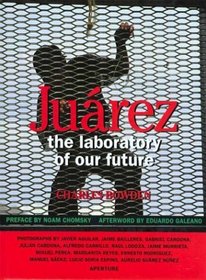Search -
Juarez : The Laboratory of Our Future
Juarez The Laboratory of Our Future
Author:
Juarez: The Laboratory of Our Time challenges the propaganda and the realities of the current relationship between the United States and Mexico, focusing on the more intimate connection between the border towns of El Paso and Juarez. Charles Bowden, who first brought attention to the story of the Juarez photographers in Harper's (D... more »
Author:
Juarez: The Laboratory of Our Time challenges the propaganda and the realities of the current relationship between the United States and Mexico, focusing on the more intimate connection between the border towns of El Paso and Juarez. Charles Bowden, who first brought attention to the story of the Juarez photographers in Harper's (D... more »
ISBN-13: 9780893817763
ISBN-10: 0893817767
Publication Date: 4/15/1998
Pages: 136
Rating: ?
ISBN-10: 0893817767
Publication Date: 4/15/1998
Pages: 136
Rating: ?
0 stars, based on 0 rating
Genres:
- Arts & Photography >> Photography & Video >> Photo Essays
- Arts & Photography >> Photography & Video >> Photojournalism
- Uncategorized >> International & World Politics >> Relations
- Nonfiction >> Social Sciences >> Emigration & Immigration
- Nonfiction >> Social Sciences >> Sociology >> Urban




